|
|
|
Sort Order |
|
|
|
Items / Page
|
|
|
|
|
|
|
| Srl | Item |
| 1 |
ID:
127938
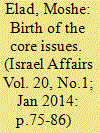

|
|
|
|
|
| Publication |
2014.
|
| Summary/Abstract |
In the last two decades, the Israeli-Palestinian conflict has been highly identified with the dispute over the core issues: Israel's annexation of East Jerusalem, the establishment of settlements in the disputed territories, the final borders between the two parties and the Palestinian refugee problem. The first three issues were a result of the 1967 war, while the refugee problem was a corollary of the 1948 war. However, it was the Israeli administration from 1967 to 1976 that exposed refugee camps to the Israeli public and made some initial efforts to resolve the problem.
|
|
|
|
|
|
|
|
|
|
|
|
|
|
|
|
| 2 |
ID:
116187
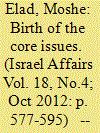

|
|
|
|
|
| Publication |
2012.
|
| Summary/Abstract |
In the past two decades the Israeli-Palestinian conflict has been identified with the dispute over four core issues: the future of East Jerusalem, the Jewish settlements in the disputed territories, the final borders between the two sides, and the fate of the Palestinian refugees. The first three issues were born during the first 10 years of Israel's control of the West Bank and East Jerusalem, while the refugee problem dates back to the 1948 war. Yet it was the Israeli administration from 1967 to 1976 that exposed the refugee camps to the Israeli public and led to initial efforts to resolve this problem. This first half of the two-part article outlines the establishment of the Israeli administration in the West Bank and East Jerusalem and lays the ground for the creation of the core issues which will be described in the second part.
|
|
|
|
|
|
|
|
|
|
|
|
|
|
|
|
| 3 |
ID:
117113
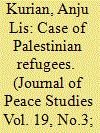

|
|
|
| 4 |
ID:
171052
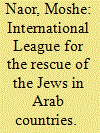

|
|
|
|
|
| Summary/Abstract |
This article discusses the campaign by the International League for the Rescue of the Jews in the Arab Countries (1948- 1950), formed by organisations representing Sephardi and Mizrahi Jews in Israel and the Herut party and aimed at preventing damage to the status of the Jews in the Arab states and promoting their emigration to Israel. The article will review the characteristics of the campaign, focusing on the public discourse it sparked in Israel around the idea of a population exchange between the Jews of the Arab states and the Palestinian refugees. This campaign, in which the memory of the Holocaust and the UN Convention on the Prevention and Punishment of the Crime of Genocide were employed, created a linkage between these two populations and expressed the political and social changes of this transitional period.
|
|
|
|
|
|
|
|
|
|
|
|
|
|
|
|
| 5 |
ID:
133745
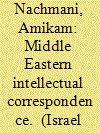

|
|
|
|
|
| Publication |
2014.
|
| Summary/Abstract |
Jacob Talmon and Arnold Toynbee were among the 20 most influential historians of the twentieth century in a list published by the Dutch journal Intermediair in May 1980. But this is not the only common denominator between them: both faced strong opposition at home - Toynbee was ridiculed and Talmon was considered a 'self-hating Jew'. Following the generally accepted definition that an intellectual is one who attempts to shape history while it is still in progress, they both tried to shape developments in the Arab-Israeli conflict and to ameliorate its consequences. They failed, but their insights and suggestions are still valid today. They differed deeply with regard to major aspects of the Middle East conflict, in particular the right of the Jewish people to statehood. Following the 1967 Six Day War, they corresponded and discussed the Middle East conflict. The article focuses on this correspondence and quotes from their private papers, books and articles over the last 70 years, and from other sources. Sadly, not much has changed in the Arab-Israeli conflict. 'That which has been, it is that which shall be; and that which has been done is that which shall be done; and there is nothing new under the sun
|
|
|
|
|
|
|
|
|
|
|
|
|
|
|
|
| 6 |
ID:
164744
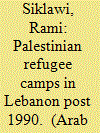

|
|
|
|
|
| Summary/Abstract |
This article addresses the issue of the Palestinian refugees in Lebanon, their camps, their resistance, and the challenges they have been facing “as refugees” to survive in the deeply divided state of Lebanon and to return to Palestine. Currently there are about 450,000 Palestinian refugees scattered among 12 official and recognized Palestinian refugee camps in Lebanon as well as many refugee gatherings; this number is part of the 6 million Palestinian refugees who are scattered in the world as a result of the establishment of the Zionist entity in 1948. However, on December 11, 1948, the United Nations General Assembly issued the UN resolution 194, during its third session, which stipulated that Palestinians have the right of return to their homes in Palestine. The Palestinian right of return is a Right and therefore it is not negotiable and cannot be compromised under any condition and/or circumstance. There have been continual attempts and proposals to terminate this Palestinian right of return to historic Palestine. To stop these toxic proposals from reaching their goals and to achieve their strategic goal, the Palestinian resistance has the legitimate right to use any means necessary, including armed struggle against the occupiers. The Palestinians in Lebanon are part of this process and they have been struggling on all levels to achieve their civil and human rights in order to improve their social and economic conditions in their refugee camps. Furthermore, the Palestinians have the legitimate right to continue their national struggle against Israel, which is the only way for the Palestinians to achieve their national goal for total liberation. However, there have been additional challenges affecting the Palestinians and their refugee camps in Lebanon post 1990; by the end of the Lebanese Civil War, the Palestinian refugee camps witnessed the emergence and growth of takfiri groups. Consequently, the Palestinian refugees have been sandwiched between oppressive Lebanese rules and the rise of the takfiris inside the camps. The article attempts to answer the following questions: What are the challenges affecting the Palestinian refugees in Lebanon? How can the Palestinians protect their identity from erasure and achieve their right of return to Palestine? Which internal and external groups currently control the camps? In what ways has takfiri ideology impacted the Palestinian identity? How can the Palestinian refugees and their camps survive under such conditions?
|
|
|
|
|
|
|
|
|
|
|
|
|
|
|
|
| 7 |
ID:
195188


|
|
|
|
|
| Summary/Abstract |
The Palestinian refugee problem is considered one of the most intractable and complex issues surrounding the Israeli-Palestinian conflict. This article examines the gaps between Israel and the Palestinians concerning the Palestinian refugee problem and considers whether back-channel diplomacy can help promote possible lasting solutions. To answer this question, several sets of peace negotiations are presented that involved back-channel communications and offered possible solutions to the problem. These include the Camp David ii summit in 2000 (including the Taba talks of 2001), the intensive back-channel negotiations between Israeli Prime Minister Ehud Olmert and the Palestinian Authority Chairman Abu-Mazen (2006–2008) ongoing when the 2007 Annapolis Conference was held, and the Kerry Proposals of 2016. The main argument is that back-channel negotiations may contribute to a solution to conflicts involving issues of human dignity and responsibility, like the issue of the Palestinian refugees.
|
|
|
|
|
|
|
|
|
|
|
|
|
|
|
|
| 8 |
ID:
088191
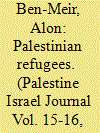

|
|
|
| 9 |
ID:
180229
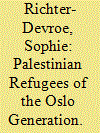

|
|
|
|
|
| Summary/Abstract |
This article analyzes the political narratives and critiques of young Palestinian refugees who have grown up in the bleak post-Oslo period. Based on ethnographic fieldwork and interviews conducted with refugee youth in Jordan and the West Bank between 2009 and 2014, I show that this generation of refugees endorses a collective Palestinian identity and peoplehood with claims to the (home)land while also narrating their identities and relations to land, nation, state, and rights as complex, multifaceted, and fractured. Their political imaginaries do not limit the political and epistemic project of decolonizing Palestine to the classic paradigm of a territorialized nation-state as enshrined in the Oslo two-state agenda. Rather, they point to a creative and radical, post-nation-statist, translocal politics for Palestine.
|
|
|
|
|
|
|
|
|
|
|
|
|
|
|
|
| 10 |
ID:
158823
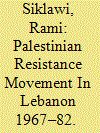

|
|
|
| 11 |
ID:
187769
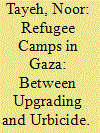

|
|
|
|
|
| Summary/Abstract |
This article examines the urban development of camps under humanitarian mandates in the context of the occupied Palestinian territories (oPt). The United Nations Relief and Works Agency for Palestine Refugees in the Near East (UNRWA) launched its Infrastructure and Camp Improvement Programme (ICIP) in 2007, with several pilot projects carried out to test this new approach. Using Gaza’s Deir El-Balah refugee camp as a case study, this article explores the contradictions inherent to development under humanitarianism and what Ilana Feldman has called “punctuations” in a chronic context of siege and infrastructure violence. That context, the article argues, perpetually sets the refugee communities back, eroding whatever capacities they were able to build up through their own collective efforts and through the aid of which they have been recipients for decades. Compounded by UNRWA’s perpetual funding shortage, the limits of development under the humanitarian umbrella within the context of a technocratic apolitical mandate become even more apparent.
|
|
|
|
|
|
|
|
|
|
|
|
|
|
|
|
| 12 |
ID:
160075
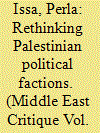

|
|
|
|
|
| Summary/Abstract |
This article questions a dominant understanding of Palestinian political factions in the refugee camps of Lebanon, which defines them as bounded structures defined by their respective ideologies. By examining the everyday practices of Palestinian refugees vis-à-vis factions, the article demonstrates that Palestinians approached factions through personal encounters with family members, friends or neighbours, rather than on ideological bases. It highlights two main points: Firstly, the central role trust plays in building political relations, particularly when constant war, displacement and discrimination define the quotidian existence of Palestinian refugees. Secondly, it brings to light how Palestinians negotiate their personal engagement with the factions, while publicly opposing them.
|
|
|
|
|
|
|
|
|
|
|
|
|
|
|
|
| 13 |
ID:
074719
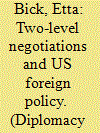

|
|
|
| 14 |
ID:
145605
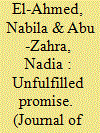

|
|
|
|
|
| Summary/Abstract |
This article argues that Israel substituted the Palestinian refugees’ internationally recognized right of return with a family reunification program during its maneuvering over admission at the United Nations following the creation of the state in May 1948. Israel was granted UN membership in 1949 on the understanding that it would have to comply with legal international requirements to ensure the return of a substantial number of the 750,000 Palestinians dispossessed in the process of establishing the Zionist state, as well as citizenship there as a successor state. However, once the coveted UN membership had been obtained, and armistice agreements signed with neighboring countries, Israel parlayed this commitment into the much vaguer family reunification program, which it proceeded to apply with Kafkaesque absurdity over the next fifty years. As a result, Palestinians made refugees first in 1948, and later in 1967, continue to be deprived of their legally recognized right to return to their homes and their homeland, and the family reunification program remains the unfulfilled promise of the early years of Israeli statehood.
|
|
|
|
|
|
|
|
|
|
|
|
|
|
|
|
|
|
|
|
|